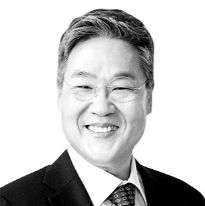Historical descriptions matter

Chung Moon-hun
The author, a former lawmaker, is chief of Seoul’s Jongno Ward. Monday was the 77th National Liberation Day. My maternal grandfather Jeon Jin-han (1901-1972) — who served as a lawmaker of the Korean Constitutional Assembly and the minister of social affairs in the government that launched on August 15, 1948 — also worked as the founding chairman of the Federation of Korean Trade Unions. While leading an anti-Japanese movement by organizing co-ops earlier, he was arrested by the Japanese police and put behind bars in Sinuiju for two years.
When I was young, my grandfather and his colleagues from the independence movement would drop by my home and tell us about their valor as independence fighters and the proud history of Korea. Not only Korea’s first President Syngman Rhee (1875-1965) and great activist Kim Gu (1876 -1949) but also lesser-known independence fighters stood up against Imperial Japan’s colonial rule and fought for the independence of the country wherever they were.
Many Koreans were involved in the anti-Japanese movement. From nonviolent demonstrations on the street to methodical assassinations of key figures of Imperial Japan, they had to stake their lives. At the center of the crusade was the Korean provisional government based in Shanghai in China and later Chongqing. Korea’s Constitution inherits legal authority from the provisional government. As Winston Churchill famously said, “A nation that forgets its past has no future.” As his warning suggests, we don’t have a future if we don’t remember the blood, sweat, and tears our forefathers shed to defend our sovereignty.
Nevertheless, many Koreans still use such expressions like “Japanese occupation” or “Japanese colonial era” without any sense of shame. Even a considerable number of Korean government ministries nonchalantly use the phrase “Japanese occupation” as if to disgrace the impregnable pride of the country by themselves.
Koreans are quite familiar with the phrase in their history textbooks — “the period of resistance against the Mongols — but not with the phrase of “the period of resistance against Imperial Japan.” The distinction suggests that though our ancestors strongly resisted the Mongol invasion in the 13th century, they sat on their hands during the Japanese aggression from 1910 through 1945. That’s totally not true. The wrong choice of words shatters the foundations of our national integrity.
Japan defines the period of Koreans fighting against Japanese colonialism as the “era of Japan ruling Korea.” The Japanese teach students that Japan ruled Korea. In a meeting on August 4 with his Korean counterparts from the Korea-Japan Parliamentarians’ Union, Seishiro Eto, a member of the House of Representatives of Japan, said, “If I speak clearly, Japan is a country akin to an older brother to Korea.” His comment was made in a similar vein. By contrast, Korean textbooks calls it “the period of Imperial Japan’s occupation of Korea” to underscore the victimhood of the country. At first glance, the phrase could be stressing the painful experiences Koreans went through during the 36 years of occupation. But regrettably, the passive frame of description only helps water down the spirit of Koreans’ resistance against Imperial Japan.
I am not saying we should raise far-right politicians bent on issuing insulting remarks about Koreans as in Japan. I am saying we need to think deeply about what to teach our next generations through history, how to teach the proactive pursuit of national pride by our ancestors, and what national identity to implant in their hearts.
We must not forget the national shame from Japan’s occupation. But at the same time, we must not ignore the steadfast battle against Imperial Japan. A passive perspective of history is not compatible with a vibrant and future-oriented Korea. We must open a new chapter of the 21st century by reviving the spirit of national pride and self-esteem from the path our ancestors took.
In 2007, the National Assembly passed a resolution urging the government to stop using self-derogatory expressions that only help justify Japan’s colonial rule of Korea. As the resolution passed through the legislature beyond party lines 15 years ago, the time has come for the press, government, scholars and ordinary citizens to stop using such shameful expressions.
“Imperial Japan’s forcible occupation” of Korea precisely reflects the victimhood of Koreans from Japan’s pillage. The never-surrendering spirit of our forefathers has no place in the phrase. Changing it to a more vibrant one representing our national pride is the way to repay all the sacrifices of our ancestors. Translation by the Korea JoongAng Daily staff.
Copyright © 코리아중앙데일리. 무단전재 및 재배포 금지.
- Is 'Extraordinary Attorney Woo' helping or hurting the autism community?
- President Yoon Suk-yeol calls Japan a 'partner' in Liberation Day speech
- The woman behind girl group NewJeans refuses to follow any formulas
- For international students, a part-time job at Starbucks is a bureaucratic nightmare
- 120,000 new Covid-19 infections reported, critical cases above 500
- Webtoon version of 'Extraordinary Attorney Woo' to be released tonight on Naver Webtoon
- Korea to experience more rain this week, but not as extreme
- Director Shin Hee-won apologizes for plagiarism in Girls’ Generation’s 'Forever 1' music video
- Son Heung-min nominated for Ballon d'Or
- 'Woo' gets mixed reviews from people who know about autism